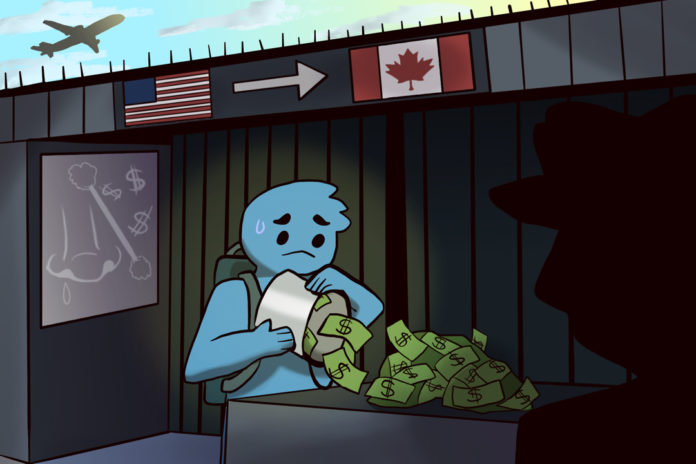The Canada-U.S.A. border will finally be open on both sides to vaccinated visitors on Nov. 8.
For many, this means visiting friends and family, more access to ski mountains, and getting cheese at a cheaper price. I certainly sighed a breath of relief when I learned that it was re-opening. I haven’t seen my grandparents, aunts, uncles, or cousins since 2019. Despite what I say about our neighbours to the South, I was glad to hear that it was opening.
But before I pack my bags and hand the border guard my passport, I think it’s worth talking about what the border closure meant for Canadians and Americans. Since its initial closure in March 2020, it became the longest border closure between the countries until Canada opened its doors for Americans this summer.
I remember being surprised to learn that although the land border was closed, air travel was still an option. It just feels elitist to shut down the Canada-U.S.A. land border, but then allow those with the means to buy a plane ticket to travel. For the two thirds of Canadians who live within 100 kilometers of the American border, driving across the border is often cheaper and more convenient than flying. In my opinion, if the border is closed, then it should be closed regardless of how you get across. And if the border is open, it should be open for everyone regardless of wealth.
It’s not just the cost of crossing the border. It’s the hassle, too.
My mom, who has American citizenship, had a heck of a time getting down to the United States to visit her parents and siblings two weeks ago. It had been almost two years since she had seen them because of COVID-19. Finally, she’d had enough. She researched the COVID-19 protocols, grabbed her (expired) American passport, and drove across the border.
Except it wasn’t that simple getting back into Canada. The Canadian border requires a negative COVID-19 test taken within 72 hours. Determined to spend as little as possible, she opted for a free COVID-19 test. Her research had promised results within one to three days, but at the test site she was told it would take three to five days before results. How are travellers supposed to adjust as they wait for results? She had to book a hotel near the border — less than an hour away from her Chilliwack home.
Paid tests are more efficient at getting results back. It seems visitors have two choices when it comes to crossing the Canadian land border: paying over $100 on average for a test to guarantee crossing the border at the right time, or getting a free test and risk paying for a hotel room or readjusting their travel schedule if the results don’t come back in time.
Again, something about the cost doesn’t add up. If it’s the difference between free and costly tests, does it really matter if results are five days old instead of three days old? Because of the 72 hour rule, a five day old negative result won’t allow you to cross the border.
Canada will still require negative test results to enter the country after Nov. 9. This isn’t exactly a bad thing — I want people to be healthy and protected — but if visitors have to be vaccinated, it doesn’t seem necessary for them to go through the hassle and cost of a COVID-19 test as well. The American border, after all, won’t require test results. I just hope the governments will clarify the test protocols and, ideally, make all tests free.
I am grateful that the border has opened for vaccinated visitors, but the hoops my mom had to jump through, and the general confusion of COVID-19 protocols, leaves me distrustful.
If you’ve looked into crossing the border, tried to plan events amidst changing protocols, or just existed in this pandemic, you’ll know what I mean. I’ve lost count of how many times I’ve combed through multiple news stories and scoured the government website trying to find relevant, updated information. A few times, I had thought I found the information I needed, only to realize the article came out in 2020 and is now outdated.
All of this may seem like I’m entitled for not being able to visit the United States with ease. I know I’m fortunate. But Canada has had a strong relationship with the United States, and many people depend on both countries. Americans have Canadian clients, and vice versa. Families are split between Canada and the United States. It makes sense that we would mourn the loss of relationships between our two countries.
Sure, I want Canadians and Americans to be healthy and protected. But I also want the border regulations to make sense and be equal for all.
Image: Danyka Van Santen/The Cascade
Danaye studies English and procrastination at UFV and is very passionate about the Oxford comma. She spends her days walking to campus from the free parking zones, writing novels she'll never finish, and pretending to know how to pronounce abominable. Once she graduates, she plans to adopt a cat.


